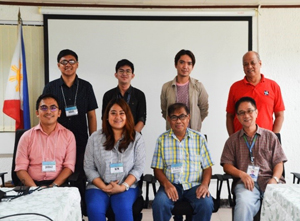 Alocasia is one of the most interesting group of aroids valuable to the Philippine ornamental industry. Of the 15 known species in the country, at least eight species are actively traded. Unfortunately, the diversity of some of these species is threatened, or worse, endangered.
Alocasia is one of the most interesting group of aroids valuable to the Philippine ornamental industry. Of the 15 known species in the country, at least eight species are actively traded. Unfortunately, the diversity of some of these species is threatened, or worse, endangered.
In a bid to protect and conserve those species at risk, a project titled “Mutation Breeding of Alocasia (Araceae) and Other Aroids through Gamma Irradiation and Chemical Treatments,” was funded by the Philippine Council for Agriculture, Aquatic and Natural Resources Research and Development of the Department of Science and Technology (DOST-PCAARRD).
The project is led by the Philippine Nuclear Research Institute (PNRI) of DOST, with De La Salle University – Dasmariñas Campus (DLSU-D). DOST-PNRI had numerous successful studies on mutation induction whereas DLSU-D has expertise on Alocasia, making the collaboration a great fit.
The project aims to create novel varieties of Alocasia and other aroids through mutation breeding after selecting and identifying aroid species with potential ornamental and horticultural value.
This effort is the very first attempt in the country to breed Alocasia through mutation breeding. Resulting new mutants of Alocasia are highly needed and anticipated by the industry. The project will cater to the conservation of these species, and enhancement of their competitiveness in the local ornamental crop industry.
A project review was held recently to discuss the issues and concerns on its project implementation. It was attended by the project leader, staff, technical review and evaluation panel, and representatives from DOST-PNRI, DLSU-D, and DOST-PCAARRD. Through this meeting, the team was able to resolve the challenges encountered and came up with specific plans and activities to aid the team in its second year of implementation.
To date, the project had already collected 16 accessions of native, introduced, and new Alocasia species. The protocol on plant tissue culture for these species was also optimized and a total of 667 in vitro plantlets of 3 out of 12 accessions have already been micropropagated.
The project also partnered with HARBEST Agribusiness Corporation through a Memorandum of Agreement (MOA), as one of the adopters of the technology of induced mutation.
It is hoped that the project will continue to focus on the objectives and deliver expected outputs by 2020.
